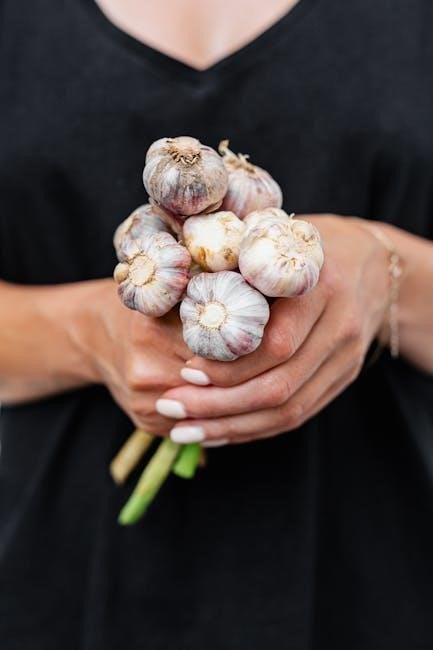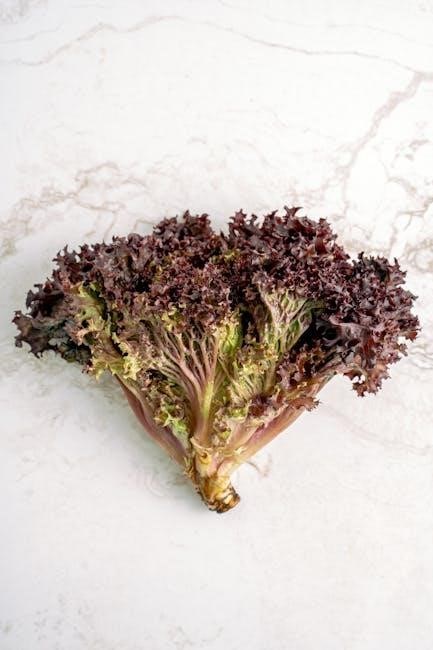Anti-inflammatory foods are powerful tools to combat chronic inflammation, promoting overall health through strategic dietary choices. These foods support a holistic approach to healing and wellness, helping to boost immunity and prevent disease.
What Are Anti-Inflammatory Foods?
Anti-inflammatory foods are nutrient-rich options that help reduce inflammation in the body. These foods are typically high in antioxidants, polyphenols, and essential vitamins and minerals. They work by neutralizing free radicals, which can cause oxidative stress and inflammation. Examples include fruits like berries, leafy greens, and spices such as turmeric. These foods support immune function, improve gut health, and may reduce the risk of chronic diseases like heart disease and diabetes. Incorporating them into your diet can promote long-term well-being and help manage inflammation naturally. They are a key component of a balanced diet aimed at preventing and alleviating inflammatory conditions, supporting overall health and vitality.
Why Incorporate Anti-Inflammatory Foods into Your Diet?
Incorporating anti-inflammatory foods into your diet can significantly reduce chronic inflammation, which is linked to various health conditions, including heart disease, diabetes, and arthritis. These foods help boost immunity, improve mental health, and promote overall well-being. By adding anti-inflammatory options to your meals, you can naturally combat oxidative stress and support long-term health. They are also rich in essential nutrients, making them a great way to enhance your diet’s nutritional value. Additionally, these foods play a role in preventing chronic diseases and improving digestive health, making them a vital part of a balanced and healthy lifestyle. Their benefits extend to mental clarity and energy levels, supporting vitality and resilience.

The Best Anti-Inflammatory Foods to Include in Your Diet
Incorporate foods like berries, leafy greens, fatty fish, turmeric, and olive oil to reduce inflammation. These options are rich in antioxidants and essential nutrients for optimal health.
Fruits with Anti-Inflammatory Properties
Fruits like berries, cherries, and citrus varieties are rich in antioxidants and polyphenols, which help combat inflammation. Berries, such as blueberries and raspberries, contain anthocyanins, powerful anti-inflammatory compounds. Cherries are known for their ability to reduce inflammation, particularly in conditions like arthritis. Oranges and grapefruits are high in vitamin C, which supports immune function and reduces oxidative stress. Apples and pomegranates also offer anti-inflammatory benefits due to their quercetin and ellagic acid content. Incorporating these fruits into your diet can help neutralize free radicals and promote overall well-being. Regular consumption may also support heart health and protect against chronic diseases.
Vegetables Known for Their Anti-Inflammatory Effects
Leafy greens like spinach, kale, and collards are rich in antioxidants and polyphenols, which reduce inflammation. Cruciferous vegetables, such as broccoli and Brussels sprouts, contain sulforaphane, a compound with potent anti-inflammatory properties. Tomatoes are high in lycopene, an antioxidant that combats inflammation. Allium vegetables, including garlic and onions, contain quercetin, which has natural anti-inflammatory effects. These vegetables support immune function, protect against oxidative stress, and may reduce the risk of chronic diseases. Incorporating a variety of colorful vegetables into meals ensures a broad range of anti-inflammatory benefits, promoting overall health and well-being.
Proteins That Help Reduce Inflammation
Fatty fish like salmon, mackerel, and sardines are rich in omega-3 fatty acids, which are potent anti-inflammatory agents. Lean meats such as chicken and turkey, when consumed in moderation, provide essential amino acids without triggering inflammation. Plant-based proteins like lentils, chickpeas, and black beans are high in fiber and antioxidants, supporting inflammation reduction. Nuts and seeds, such as walnuts and flaxseeds, contain alpha-linolenic acid (ALA), another omega-3 fatty acid. These protein sources help inhibit pro-inflammatory pathways and promote healing. Incorporating diverse proteins ensures a balanced intake of nutrients that support immune function and overall health, making them vital additions to an anti-inflammatory diet.
Whole Grains and Their Role in Reducing Inflammation
Whole grains are rich in fiber, antioxidants, and anti-inflammatory compounds that play a crucial role in reducing inflammation. They contain magnesium, selenium, and B vitamins, which help combat oxidative stress and inflammation. Oats, quinoa, brown rice, whole wheat bread, and barley are excellent choices. Unlike refined grains, whole grains retain their bran, germ, and endosperm, preserving their nutritional value. They have a lower glycemic index, preventing sudden spikes in blood sugar that can exacerbate inflammation; Regular consumption of whole grains supports gut health, enhances immune function, and reduces the risk of chronic diseases. Incorporating them into meals is a simple yet effective way to adopt an anti-inflammatory lifestyle.
Healthy Fats Essential for Fighting Inflammation
Healthy fats, particularly omega-3 fatty acids, play a vital role in reducing inflammation. Found in fatty fish like salmon, mackerel, and sardines, these fats combat inflammation by targeting specific pathways in the body. Avocados, nuts, seeds, and olive oil are also rich in anti-inflammatory properties. Omega-3s help lower levels of inflammatory markers, such as C-reactive protein, while promoting the production of anti-inflammatory hormones. Incorporating these fats into meals supports heart health, improves brain function, and aids in managing chronic conditions. They also enhance the absorption of vitamins and antioxidants, making them a cornerstone of an anti-inflammatory diet. Balanced intake of healthy fats is essential for overall well-being and combating inflammation effectively.
Spices and Herbs with Potent Anti-Inflammatory Properties
Certain spices and herbs are renowned for their strong anti-inflammatory effects. Turmeric, containing curcumin, is one of the most potent, inhibiting inflammatory enzymes and reducing chronic inflammation. Ginger, with its active compound gingerol, alleviates pain and inflammation in conditions like arthritis. Cinnamon, cloves, and black pepper also exhibit powerful anti-inflammatory properties, aiding in reducing inflammation and improving overall health. These natural remedies have been used for centuries to combat inflammation and enhance well-being. Incorporating them into meals can provide significant health benefits, making them essential additions to an anti-inflammatory diet.

The Role of Antioxidants in Reducing Inflammation
Antioxidants play a crucial role in reducing inflammation by neutralizing free radicals, which cause oxidative stress and inflammation. They support overall health and protect against chronic diseases.
How Antioxidants Combat Free Radicals
Antioxidants neutralize free radicals by stabilizing unstable molecules, preventing oxidative stress and inflammation. Free radicals damage cells, leading to chronic conditions like arthritis and heart disease. Antioxidants, found in foods like berries, leafy greens, and nuts, bind to free radicals, reducing their harmful effects. This process minimizes inflammation, protects cellular health, and supports immune function. By incorporating antioxidant-rich foods into your diet, you can effectively combat free radicals and promote long-term wellness.
Top Antioxidant-Rich Foods to Add to Your Diet
Incorporating antioxidant-rich foods is essential for reducing inflammation and oxidative stress. Berries, such as blueberries and raspberries, are packed with anthocyanins, powerful antioxidants that combat free radicals. Leafy greens like spinach and kale offer vitamins C and E, which protect cells from damage. Nuts, including walnuts and pecans, are rich in polyphenols that support immune function. Pomegranates, oranges, and sweet potatoes are also high in antioxidants like vitamin C and beta-carotene. Green tea contains catechins, which help reduce inflammation. These foods, when added to your diet, enhance overall health and contribute to a balanced anti-inflammatory lifestyle.

Foods to Avoid That May Cause Inflammation
Processed foods, sugary drinks, and refined carbohydrates can trigger inflammation. Avoid red meat, dairy, and foods high in saturated fats to reduce inflammation naturally and promote healing.
Processed Foods and Their Impact on Inflammation
Processed foods are a significant contributor to inflammation due to their high content of unhealthy ingredients like refined sugars, sodium, and unhealthy fats. These foods often contain artificial additives and preservatives that disrupt the body’s natural balance. Regular consumption of processed foods can lead to chronic inflammation, increasing the risk of conditions such as heart disease, diabetes, and autoimmune disorders. Examples include frozen meals, fried snacks, and sugary beverages. The body reacts to these substances by triggering an inflammatory response, which, over time, can cause long-term damage to tissues and organs. Minimizing processed foods is essential for maintaining a healthy, anti-inflammatory diet.
Sugary Foods and Drinks That Exacerbate Inflammation
Sugary foods and beverages are among the top contributors to inflammation in the body. Refined sugars, found in sodas, candies, baked goods, and sweetened drinks, trigger a rapid spike in blood sugar levels. This leads to insulin resistance and oxidative stress, both of which fuel chronic inflammation. Regular consumption of these items can result in persistent inflammation, increasing the risk of conditions like diabetes, heart disease, and autoimmune disorders. Additionally, sugar promotes the production of advanced glycation end (AGE) products, which further exacerbate inflammation. Reducing or eliminating sugary foods and drinks is a crucial step in adopting an anti-inflammatory diet and improving overall health.
Dairy Products and Their Effects on Inflammation
Dairy products can have varying effects on inflammation, depending on the type and individual tolerance. While some people may experience inflammation due to lactose intolerance or sensitivity to milk proteins like casein or whey, others may find certain dairy products beneficial. For instance, fermented dairy products such as yogurt and kefir contain probiotics, which support gut health and may help reduce inflammation. However, processed dairy products high in saturated fats and added sugars can promote inflammation. Moderation is key, and choosing unprocessed, low-lactose, or plant-based alternatives may be better for those prone to inflammatory responses. Balancing dairy intake and opting for healthier options can help minimize its inflammatory impact.

Tips for Incorporating Anti-Inflammatory Foods into Your Meals
Plan meals around anti-inflammatory foods, use a shopping list to ensure healthy choices, and incorporate a variety of fruits, vegetables, whole grains, and lean proteins to balance nutrients.
Meal Planning Strategies for Reducing Inflammation
Effective meal planning is key to incorporating anti-inflammatory foods into your diet. Start by focusing on whole, unprocessed foods like fruits, vegetables, whole grains, and lean proteins. Rotate ingredients weekly to ensure variety and maximize nutrient intake. Include anti-inflammatory staples such as fatty fish, turmeric, ginger, and leafy greens in your recipes. Avoid processed foods and sugary snacks, which can trigger inflammation. Use a shopping list to stay organized and ensure you have healthy options on hand. Plan balanced meals that combine flavors and textures to keep your diet enjoyable and sustainable. This approach not only reduces inflammation but also supports overall health and vitality.
Shopping List Essentials for an Anti-Inflammatory Diet
Stocking your pantry with anti-inflammatory foods is the first step toward a healthier diet. Fruits like berries, citrus, and apples are rich in antioxidants. Vegetables such as leafy greens, broccoli, and sweet potatoes should be staples. Proteins like fatty fish (salmon, mackerel), lean meats, and plant-based options (beans, lentils) are essential. Whole grains such as quinoa, brown rice, and oats provide sustained energy. Healthy fats like avocados, nuts, seeds, and olive oil support heart health. Don’t forget herbs and spices like turmeric, ginger, and garlic, which are potent anti-inflammatory agents. Keeping these items on hand ensures you can prepare nourishing, inflammation-fighting meals effortlessly.
Adopting an anti-inflammatory diet is a powerful way to enhance overall health and well-being. By focusing on nutrient-dense foods like berries, leafy greens, and omega-3 rich fish, individuals can significantly reduce chronic inflammation. This approach not only alleviates symptoms of conditions like arthritis but also supports heart health and mental clarity. Incorporating anti-inflammatory foods helps combat oxidative stress, boosts immunity, and may even prevent certain diseases. The long-term benefits extend beyond physical health, promoting a vibrant and energetic lifestyle. Embracing this dietary strategy is a proactive step toward achieving optimal wellness and maintaining a balanced, thriving body.



